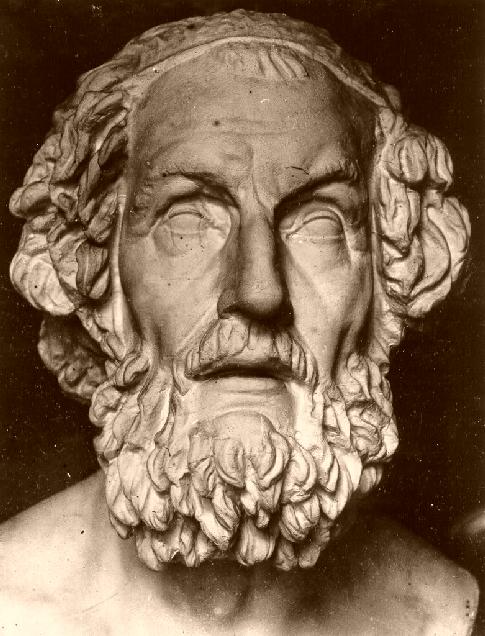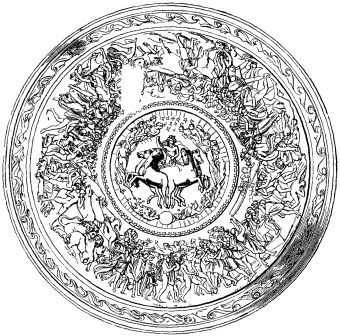By studying various philosophers and historical figures, I have learned many life lessons. I will take you on an adventure through history, introducing you to my mentors and teaching you the lessons that I have found most important to achieve a well-ordered world of my own. I will provide a list of my lessons to allow you to navigate easily throughout our adventure.
Just a quick disclaimer before we get started: a tid bit of information about order in my life -- I am a very organized, type-A, scheduled person. Therefore my interpretations of such historical figures and texts are how I see they apply to my life and my order. Some may say I have more of a mathematical brain and therefore see things, or prefer things, orderly and organized, patterned and even. Therefore, my lessons revolve around such order as you will see. Let's begin...
Components of order, as dissected from my readings:
1. Moderation, taught by: Aristotle
2. Balance, taught by: Homer
3. Responsibility, taught by: Thomas Jefferson
4. Familiarity, taught by: Elizabeth Cady Stanton
"These acts cannot be prescribed exactly, but must avoid excess and defect"

ARISTOTLE
First off, I'd like to introduce you to Aristotle. Of Aristotle's work, I have studied his Nicomachean Ethics, a set of ten books through which Aristotle describes both man's purpose and human order. Aristotle argued for a world of ethical and virtuous action. In his well-ordered world, men acted in such ways that, in the end, they achieved happiness. From Aristotle, I was taught the lesson of moderation. Aristotle believed that there was a certain Golden Mean, this is the middle ground for a certain virtue. For example, courage is the mean between deficiency and excess which, in this case, is cowardice and rashness. This point proves true in my life, as you may find it applies in yours as well. Too much of something is just as bad as too little of something and I have thus tried to apply this to my life. For example, too much play time is just as bad as too much work time. One must achieve the mean between the two to achieve their own well-ordered world.
Picture from: http://www.stenudd.com/myth/greek/aristotle.htm
For more information about Aristotle, click here: http://en.wikipedia.org/wiki/Aristotle
Quote from: http://classics.mit.edu/Aristotle/nicomachaen.html (entire text of Nicomachean Ethics)
"In one [city], there were feasts and weddings."
"The second city was surrounded by two armies, soldiers with glittering weapons."
 HOMER
HOMER
Meet Homer. He is the author of the Iliad, from which book 18 taught me the lesson of balance, similar to that of Aristotle's lesson of moderation. In book 18, titled "Shield of Achilles," Homer describes the physical shield, each component that makes up the whole. Not necessarily from Homer's words directly, but more from the overall idea of the shield, I learned that balance is an important factor to order. Let me explain, further. With the good, comes the bad. For example, Homer described the city in peace and the city at war, from which I interpreted that with a world of good there must also be a world of bad. The good is not appreciated without the bad, for there would be nothing to compare it to. This balancing act is a part of the order in the world. You can't expect for everything or everyone to be a certain way all of the time, for this would be perfection, not balance. Just like in my example of moderation, with balance you must have an aspect of each component in this case, rather than extreme in the case of moderation. For instance, taking a class involves two components. The first component is that you are learning something and gaining knowledge (the good). The second component is that you have homework to do or have class to attend (the bad).
Picture from: http://russellmcneil.blogspot.com/2007/08/homer-c-900-bce.html
For more information about Homer, click here: http://en.wikipedia.org/wiki/Homer
Quotes from: http://www.aoidoi.org/poets/homer/il/shield.pdf
The shield (representation and actual photo), CLICK HERE
"...Organizing its powers in such form, as to them shall seem most likely to effect their Safety and Happiness."
You
may already know him, but a reintroduction never hurts. Here is Thomas
Jefferson, known for the "Declaration of Independence." Through his action of writing the declaration, as well as through his
words that compose the declaration, Jefferson has taught me that responsibility plays a
role in order in the world. You see, from Jefferson, and the rest of the
the representatives of the United States, actually writing and declaring
independence from Great Britain, they are doing their duty and
responsibility of defending or declaring God-given rights for their
fellow citizens. From this point on, on a large scale, it is the
people's responsibility to create laws and to organize power in a way
that defends justice and individual rights. This responsibility is part
of a well-ordered world, for each person should look out for their own
rights, in a manner that allows others to retain their rights, and with
these rights defended, order will be preserved. In the U.S., it is the
responsibility of each citizen to obey the laws created by our
government. Without doing so, we disrupt the order in the country, as
well as in our lives. For example, if I break a law and am arrested for
doing so, the time spent in jail is throwing off the balance and the
moderation in my life. If it costs $1,900 to bail me out of jail, this
interferes with my spending moderation as well as my time balancing. My
personal order is thrown off just by not acting responsibly.
Responsibility as a means of order can also be taken down to a smaller
scale. If I have a responsibility in my job and fail to uphold my
responsibility, the order in my life is disrupted by the repercussions (ie:
firing from work, more time spent in the office, loss of
family/personal/play time).
Picture from:
http://www.earlyamerica.com/portraits/jefferson.html For
more information about Jefferson, click here:
http://en.wikipedia.org/wiki/Thomas_Jefferson Quote
from:
http://www.ushistory.org/declaration/document/index.htm
"We
hold these truths to be self evident..."
And last, but certainly not least, I'd like to
introduce you to my dear mentor, Elizabeth Cady Stanton. She is a
women's rights leader who delivered her "Declaration of Sentiments" to a group of activists at a
convention in Seneca Falls. More through her tact in composing her
speech rather than the content and literal message, Stanton taught me
that familiarity
belongs with order. Stanton took the structure and even used exact
paragraphs and phrases from Jefferson's "Declaration of Independence."
By doing so, she presented her ideas in a manner that the women were
already accustomed. The ideas she presented seemed even more powerful
and right when repeated in this way. Familiarity, related to routine, is
the aspect of order that one may over look, as I did. Familiarity
creates a sense of comfort as well as allowing for habit and repetition,
all parts of this aspect of order. As I said, familiarity can be created
by patterns, which involve repetition of the same or similar situations
or objects, whatever the pattern relates to. In my life, organization
and order are created by schedule and pattern, these of which include
familiar situations, behaviors, or activities. For example, daily, I
have a certain routine in the morning involving washing my face and
brushing my teeth, to say the least. Each day my routine is followed,
giving me a sense of familiarity and creating the order in my life,
getting me ready to carry out my proceeding daily schedule.
Picture from:
http://womenshistory.about.com/od/suffragists/ig/Women-s-Suffrage-Activists/Elizabeth-Cady-Stanton.--33.htm
For more information about Stanton, click here:
http://en.wikipedia.org/wiki/Elizabeth_Cady_Stanton Quote
from:
http://www.closeup.org/sentimnt.htm
ACHILLES' SHIELD:
Representation of Achilles' Shield
Rendering of Achilles' Shield

 ELIZABETH
CADY STANTON
ELIZABETH
CADY STANTON
